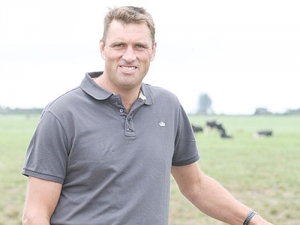Otago Regional Council to launch winter flyovers
Otago Regional Council is set to begin its annual winter farm flyovers in the next three weeks.
 Otago farmer Robert Borst has spent $150,000 on consultants and legal advice in his negotiations with Otago Regional Council.
Otago farmer Robert Borst has spent $150,000 on consultants and legal advice in his negotiations with Otago Regional Council.
A last-minute turnaround decision by the Otago Regional Council was the last straw for Oamaru dairy farmer Robert Borst.
The decision could put him out of business, he says. Hence his frustration that boiled over in a dumping of cow manure outside the council’s Dunedin office.
Borst had spent four years and up to $150,000 on consultants and legal advice on negotiations with the council over consents after a special sensitive zoning was imposed on his Five Forks farm.
As a goodwill gesture he had already voluntarily reduced stocking rates by 20% and nitrogen leaching by up to 25%. He has carried extra interest payments imposed by the bank because his valuation dropped 60% temporarily because of uncertainty over the consents.
He had spent money on consultants, advisers and reports. He was doing his best to put together a comprehensive consent application despite being told at various stages by the council it wasn’t clear what was needed because they hadn’t considered such as application before.
Borst had endured being told by a council head scientist who came to carry out significant water tests there was not future for dairying on the sensitive land. He felt this was predetermining his consent. He had tried to cooperate with ever-changing decisions and criteria for the application.
But when he finally submitted the consent and two weeks later was told the council had changed its mind and that the consent would have to be a notified application, he had had enough.
The Borsts had been told if they could show considerable progress in N leaching, that would justify a non-notified process. They had done that at considerable cost and effort.
A notified process would cost tens of thousands more, take years and possibly put him and his wife Sylvia out of business as they continued to struggle with doubled interest rates.
That is when Borst dumped a load of manure outside the Otago Regional Council Dunedin offices out of “sheer frustration”. “We are at the end of our tether,” Borst told Dairy News. “I am not proud of what we did. It wasn’t premeditated; it was just something out of sheer frustration and an accumulation of emotions.
“We don’t know where to go. We haven’t got the luxury of going through a notified process. We are under financial pressure because of the high interest rates and we’ve got to deal with the drought and the low payout.
“We deal with those things as farmers all the time – but when the whole underlying value of your property is under threat, you can only survive that for so long. And there’s no certainty that the consent would be granted at the end of it.
“It is hard to make management decisions, not knowing if we are going to be here next year or not.”
Borst says he is a born-and-bred dairy farmer. He worked up to ownership from starting out as a farm worker. His operation (3000 cows on three dairy units) is a family farm with himself and Sylvia as partners.
“We’ve spent somewhere between $150,000-$200,000 on consultants, legal advice, etc to date,” he says. “It has been a lonely battle as well because we are basically fighting on our own.”
To do a water study required for the consent will cost at least tens of thousands and take 12-18 months. “Submitting a public submission, hearings, professional support – we are probably talking about hundreds of thousands and no guarantee we would get a consent at the end of it anyway.
“We already reduced nitrogen leaching as a goodwill gesture at the start of this consultation. We acknowledged we are in a sensitive zone and started to reduce our N footprint.
“But we can’t keep reducing stocking rate and stay economic, so it’s a balancing point. How far do you keep going? Until you have no business?”
He has been communicating with Federated Farmers Otago president Richard Strowger and national president William Rolleston throughout the process but has not had any recent feedback.
Since his dumping protest he has had support from the farming community and other businesses. He has had 60-70 text messages from farmers, businesses and strangers around New Zealand.
Effective from 1 January 2026, there will be three new grower directors on the board of the Foundation for Arable Research (FAR).
The National Wild Goat Hunting Competition has removed 33,418 wild goats over the past three years.
New Zealand needs a new healthcare model to address rising rates of obesity in rural communities, with the current system leaving many patients unable to access effective treatment or long-term support, warn GPs.
Southland farmers are being urged to put safety first, following a spike in tip offs about risky handling of wind-damaged trees
Third-generation Ashburton dairy farmers TJ and Mark Stewart are no strangers to adapting and evolving.
When American retail giant Cosco came to audit Open Country Dairy’s new butter plant at the Waharoa site and give the green light to supply their American stores, they allowed themselves a week for the exercise.
President Donald Trump’s decision to impose tariffs on imports into the US is doing good things for global trade, according…
Seen a giant cheese roll rolling along Southland’s roads?